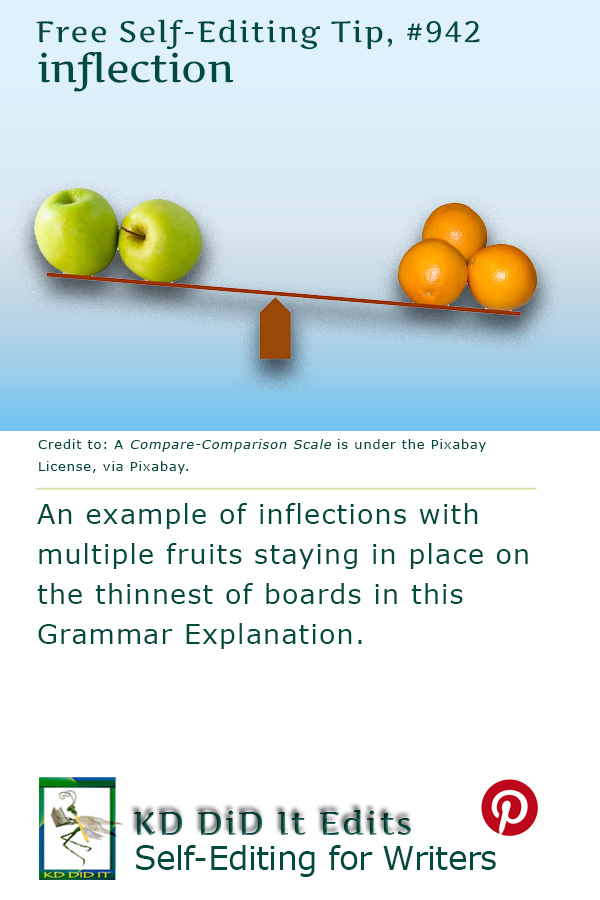Inflection is the name for the extra letter or letters added to nouns, verbs, and adjectives in their different grammatical forms. Nouns are inflected in the plural, verbs are inflected in the various tenses, and adjectives are inflected in the comparative/superlative.
In the table below, you’ll find some of the most important inflection rules.
Grammar Explanations is . . .
. . . an evolving list of the structural rules and principles that determines where words are placed in phrases or sentences as well as how the language is spoken. Sometimes I run across an example that helps explain better or another “also known as”. Heck, there’s always a better way to explain it, so if it makes quicker and/or better sense, I would appreciate suggestions and comments from anyone on an area of grammar with which you struggle or on which you can contribute more understanding.
If you found this post on “Inflection” interesting, consider subscribing to KD Did It, if you’d like to track this post for future updates.
| Original Word Type | Inflection Rule | Examples |
|---|---|---|
| Words ending with a sibilant: -s/-ss/-sh/-ch/x. |
Add -es in the plural noun or 3rd person singular verb. | bus → buses (n) / busses (v) miss → misses wish → wishes watch → watches fox → foxes |
| Words ending with the letter -o. | potato → potatoes do → does |
|
| Words ending in a consonant + -y. | Change the -y to ie before the ending -s. | party → parties study → studies cry → cries |
| Change the -y to i before the endings -ed/-er/-est/-ly. | try → tried happy → happier easy → easiest |
|
| Do NOT change the -y before the ending -ing. | carry → carrying study → studying try → trying |
|
| Words ending in a vowel + -y. | Do NOT change the -y. | buy → buys play → played |
| Words ending with the letters -ie. | Change the -ie to a -y before the ending -ing. | die → dying lie → lying |
| Verbs ending in a consonant + -e. | Omit the -e before the ending -ing. | ride → riding love → loving write → writing provide → providing |
| One-syllable words ending consonant-vowel-consonant. | Double the last consonant before the endings -ing/-ed/-er/-est. | hit → hitting stop → stopped wet → wetter fat → fattest |
| Two or more syllable words ending consonant-vowel-consonant that are stressed on the last syllable. | begin → beginning prefer → preferred |
|
| Two or more syllable words ending consonant-vowel-consonant that are stressed on the first syllable. | Do NOT double the last consonant before the endings -ing/-ed/-er/-est. | happen → happening visit → visited |
C’mon, get it out of your system, bitch, whine, moan . . . which words are your pet peeves? Also, please note that I try to be as accurate as I can, but mistakes happen or I miss something. Email me if you find errors, so I can fix them . . . and we’ll all benefit!
Satisfy your curiosity about other Grammar Explanations by exploring its homepage or more generally explore the index of self-editing posts. You may also want to explore Book Layout & Formatting Ideas, Formatting Tips, Grammar Explanations, Linguistics, Publishing Tips, the Properly Punctuated, Word Confusions, Writing Ideas and Resources, and Working Your Website.
Resources for Inflection
“Inflections.” Frankfurt International School. n.d. Web. n.d. <http://esl.fis.edu/grammar/rules/inflections.htm>.
Pinterest Photo Credits:
A Compare-Comparison Scale is under the Pixabay License, via Pixabay.


